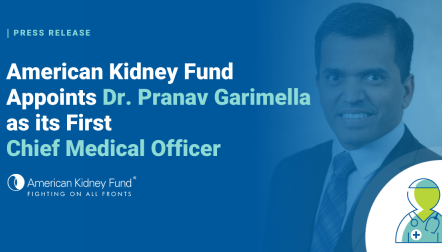
Blog post
What is PKD? 10 facts about the most common form of genetic kidney disease

Sept. 4 is Polycystic Kidney Disease (PKD) Awareness Day, and while it is the most common form of genetic kidney disease, you may not know much about it. Fortunately, as part of its mission to fight kidney disease on all fronts, the American Kidney Fund (AKF) is working to promote awareness and understanding of rare kidney diseases like PKD.
So, what is PKD? PKD is the result of a change in your genes (a genetic mutation) that causes cysts (fluid-filled growths) to grow inside your kidneys.
There are numerous resources and tools available on AKF's website to help you learn about PKD and navigate a PKD diagnosis, but here are 10 facts about PKD you may not know.
- Approximately 37 million Americans are currently living with kidney disease, and about 2% of them are living with PKD.
- There are two forms of PKD: autosomal dominant polycystic kidney disease (ADPKD) and autosomal recessive polycystic kidney disease (ARPKD). The former is more prevalent with about 9 out of 10 cases of PKD being ADPKD. ARPKD primarily affects infants and children, with approximately 1 in 25,000 children living with ARPKD, according to the PKD Foundation.
- You only need to have one parent with ADPKD to be born with it yourself. If you have been diagnosed with ADPKD, it is likely one of your parents has the disease as well, even if they have not been diagnosed.
- PKD can cause thousands of cysts to grow inside the kidneys and can make the kidneys become larger than normal — some kidneys can even weigh up to 30 pounds!
- Cysts from PKD cause damage to the kidneys, which can cause kidney pain, kidney stones or even kidney failure.
- Although they are born with the disease, people with ADPKD may not experience any symptoms until they are between the ages of 30 and 50!
- About half of people with PKD will have kidney failure by the time they are 60 years old.
- PKD can cause other health problems, too, including high blood pressure, urinary tract infections, colon problems, cysts on the pancreas or liver, heart problems, brain aneurysms or (for pregnant women) preeclampsia (a type of high blood pressure that can be dangerous for mom and baby).
- There is no cure for kidney disease, including PKD, and any damage to the kidneys cannot be reversed. However, there are lifestyle changes you can make to help slow the progression of kidney disease.
- In 2018, the FDA approved the first-ever drug to specifically treat ADPKD. If you have ADPKD, you may be eligible to take this twice a day pill that helps slow down the growth of cysts.
Be sure to explore these AKF resources to learn more about PKD, including how to find out if you have the disease:


